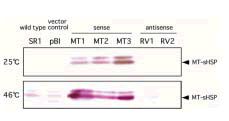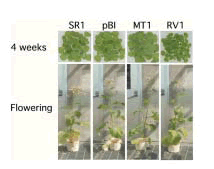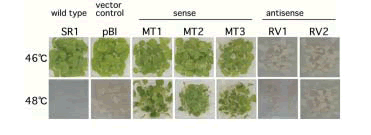Thermotolerance of transgenic tobacco with altered expression of mitochondrial small heat shock proteins
Description
[Objectives]
Plants respond to heat stress by repressing the expression of mRNAs for most normal proteins that induce the synthesis of heat shock proteins (HSPs). Heat-stressed plant cells accumulate mitochondria-located small heat shock proteins (MT-sHSP) and the accumulation is synchronized with the thermotolerance of mitochondria. Under heat stress, mitochondrial metabolic pathways breakdown and function abnormally, thus diminishing cell viability. While Division researchers have already shown that tomato MT-sHSP has a molecular chaperone function in vitro, the goal of this study was to clarify the role of MT-sHSP in vivo during heat-shock response using MT-sHSP transgenic tobacco.
[Results]
Researchers introduced the tomato MT-sHSP gene into tobacco plants (Nicotiana tabacum L. cv. SR1) with sense and antisense constructs under the control of the CaMV 35S promoter, and then examined the thermotolerance of the seedlings. Sense plants overexpressed MT-sHSP even under normal growth temperatures, while antisense transformants accumulated less MT-sHSP than control plants under heat stressed conditions (Fig. 1). Irrespective of gene orientation, sense or antisense, transgenic plants exhibited a normal morphology and growth rate in the vegetative growth stage (Fig. 2). Thus, MT-sHSP does not have a pleiotropic effect on vegetative growth under normal conditions.
When the 4-week-old seedlings (T2 progeny) were exposed to sudden high temperature stress for two hours, sense plants exhibited thermotolerance and survived at 48°C, whereas control tobacco did not survive. On the other hand, antisense plants were susceptible to stress at 46°C, whereas control tobacco can survive under such conditions (Fig. 3). These results indicate that MT-sHSP plays a pivotal role in heat-shock response.
Figure, table
-
Fig. 1. Expression of the gene for MT-sHSP in transgenic tobacco plants. Four-week-old seedlings of the wild type (SR1) and T2 homozygous lines into which a vector without an insert (pBI) or the MT-sHSP gene was introduced (sense: MT1, 2 and 3, antisense: RV1 and 2) were subjected to Western blot analysis with anti-MT-sHSP antibody. Mitochondrial fractions for the analysis were prepared using seedlings sampled before (25°C) and after (46°C) the heat stress treatment for 2 hours. -
Fig. 2. Transgenic tobacco plants having the tomato MTsHSP gene. Tobacco plants of the wild type, SR1 and T2 transgenic lines without an insert or with the MT-sHSP sense or antisense gene (pBI, MT1 and RV1, respectively) were germinated and grown on MS medium for 4 weeks. The young seedlings were then transferred to soil in a greenhouse and kept at 25°C. The morphology and growth rate of the plants were observed 4 weeks after seeding and on the day of flowering. -
Fig. 3. Thermotolerance of the transgenic plants with the MT-sHSP gene. Four-week-old seedlings of the wild type and T2 homozygous lines grown as shown in Fig. 2 were exposed to heat stress at 46°C or 48°C for 2 hrs. The seedlings were photographed 7 days after treatment.
- Affiliation
-
Japan International Research Center for Agricultural Sciences Okinawa Subtropical Station
- Classification
-
Technical A
- Term of research
-
FY2002 (FY1998-2002)
- Responsible researcher
-
SHONO Mariko ( Okinawa Subtropical Station )
SANMIYA Kazutsuka ( Bio-oriented Technology Research Advancement Institution )
LIU Jian ( Shandong Teacher University, China )
SINGH Ishwar ( Indian Institute of Sugarcane Research, India )
DIN Jaral Ud ( Land Resources Research Institute, Pakistan )
SUZUKI Katsumi ( Okinawa Subtropical Station )
TSUKAGUCHI Tadashi ( Bio-oriented Technology Research Advancement Institution )
EGAWA Yoshinobu ( Okinawa Subtropical Station )
- ほか
- Publication, etc.
-
Liu, J. and Shono, M. (1999) Characterization of mitochondria-located small heat shock protein from tomato (Lycopersicon esculentum). Plant and Cell Physiology, 40, 1297–1304.
- Japanese PDF
-
2002_24_A3_ja.pdf696.67 KB
- English PDF
-
2002_24_A4_en.pdf61.6 KB



